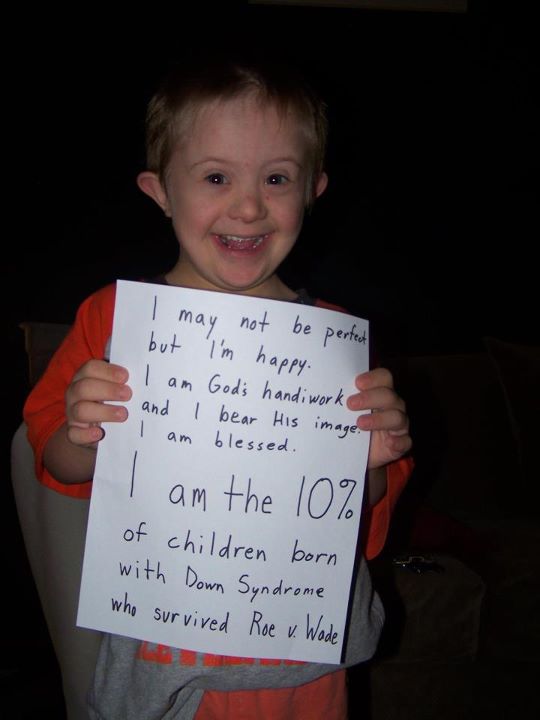In a land of “liberty” and “opportunity” it is difficult to imagine a person’s worth being assigned to him based on his ability, yet this is exactly what we do when we allow elective abortion based on a genetic abnormality diagnosis.
Along with many other Americans, I have a relative with Down Syndrome, and can attest that persons with disabilities are just as valuable and have lives just as full as persons without them. Recently, Prince William and his wife Catherine brought attention to the reality that persons with Down Syndrome are worthy of respect and admiration. As reported by the Huffington Post, the royal couple does not usually accept gifts but made an exception recently when they received a beautiful painting made for them by 43-year-old Tazia Fawley, an artist with Down Syndrome. Suzie Moffat, the director of Heart & Sold, an organization that supports artists with Down Syndrome and helped pass on the painting to the royal couple, noted, “[i]n England, there always has been a stigma attached to (Down Syndrome), and now that is washed away by the fact that the Duke and Duchess have accepted that painting…For this to happen, it’s kind of turned that negativity around.”
 To deny a person the opportunity to experience life because he is different or faces physical challenges violates basic human rights and the principles at the heart of our nation. It also deprives the rest of us and our children the opportunity to love and to learn from very special people like Tazia Fawley who may be different from us but who have incredibly generous hearts and unique perspectives.
To deny a person the opportunity to experience life because he is different or faces physical challenges violates basic human rights and the principles at the heart of our nation. It also deprives the rest of us and our children the opportunity to love and to learn from very special people like Tazia Fawley who may be different from us but who have incredibly generous hearts and unique perspectives.
Thanks to a recent dismissal of the case against the Prenatal Non-Discrimination Act (PRENDA) in North Dakota, that State is now the first to have a law in place defending pre-born children with disabilities. Along with a ban on sex selective abortion, the North Dakota PRENDA law is the first of its kind to offer protection to children diagnosed with Down Syndrome and other genetic abnormalities.
Policy experts from FRC were front and center during the hearings debating the bill this past spring. Joined by some of our colleagues in other groups FRC presented scientific, legal, and human rights arguments in support of the legislation. Abortion is a particularly grievous threat to pre-born children diagnosed with genetic abnormalities such as Down Syndrome. According to published studies, a staggering 92% of pre-born children diagnosed with Down Syndrome are aborted.[1] This statistic is unacceptable.
In the new law and after birth a person is legally protected from discrimination based on gender and disability. This standard reflects and upholds the high values we hold dear — that all men are created equal and endowed by their Creator with unalienable rights. Allowing abortion of a person based on her gender or disability asks us to eschew those values. This is incompatible with the Constitution and a society that places such high value on the dignity of the individual. It is particularly troubling to deny these rights to those persons who do not have a way to speak for themselves but rather rely on those in power for protection.
North Dakota may have been the first State to enact legislation protecting pre-born persons with disabilities, but it is our hope that many more States will follow in its footsteps. Persons with disabilities add beautiful dimension to the world, a world that would be much darker absent their presence. Instead of eliminating persons with disabilities and denying them the right to live based on their differences, we should celebrate those differences and open our hearts to everything they have to teach us. Life through their eyes is a dazzling new experience — one brimming with endless possibility.
[1] Joan K Morris, professor of medical statistics, Eva Alberman, emeritus professor, BMJ, “Trends in Down’s syndrome live births and antenatal diagnoses in England and Wales from 1989 to 2008: analysis of data from the National Down Syndrome Cytogenetic Register,” BMJ 2009;339:b3794. (bmj.com).
LifeNews Note: Anna Higgins writes for the Family Research Council blog and she is director of the Center for Human Dignity at the Family Research Council.







